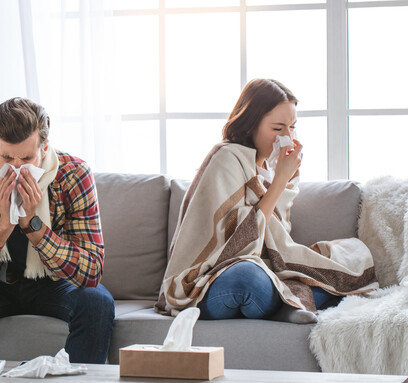What is a cold?
The human nose is actually the “entrance gate” of the outside world to the body. It is equipped with defenses designed to stop invaders, such as viruses and bacteria, on their way into our bodies. In 2018, researchers from Northeastern University in Boston, Massachusetts (a teaching hospital affiliated with Harvard Medical School), and several other organizations, described one of those “protectors” in an article also published in the journal The Journal of Allergy and Clinical Immunology. When the nose detects bacteria, it releases a swarm of tiny fluid-filled sacs designed to attack and neutralize it. The body, which recognizes that there is something that may attack it, produces a defense system in order to stop the intruder. This is actually how the common cold is created: nasal congestion, a cold and all that implies.
The connection between cold and diseases
Additional research suggests that common respiratory viruses thrive at lower temperatures. In 2015, a research team from Yale University used mice to demonstrate that viralThey replicate more rapidly in cold temperatures, since antiviral immune responses are not as strong under these conditions. A study by the National Institutes of Health also showed that Influenza viruses spread faster in cool climates.
“The new article builds on previous work that provides a real, quantitative biological explanation for the question – why the body is more susceptible to viral infections when it is exposed to cold,” says Blair, the lead researcher. For the study, the researchers measured the nasal temperatures of healthy human volunteers at about 25 degrees and then at 15 degrees. They found that the temperature of the nasal cavity decreased by about 22 degrees Celsius in the colder condition. Then, in the lab, they exposed samples of nasal cells to a similar drop in temperature, to mimic what actually happens inside the nose in a cold climate. It was found that the immune response was significantly poorer at the lower temperature.
Ultimately, the finding may lead to new treatments, assuming the researchers can find a way to increase the innate immune response of the nose, even under cold temperature, and thus it will be possible to stop more viral diseases before they spread in the body. A drug or vaccine that can activate the immune response locally, will allow protection of the rest of the body and prevention of a typical winter illness.
Until that happens, here are some tips to help prevent infection and illness in the winter months:
- Get vaccinated for flu (and also for corona if you are in the relevant risk group).
- Make sure to wash your hands before every meal, and after every cough, sneeze or dessert.
- Sneeze and cough into your elbow or into a tissue – not into your hand. Throw away the used paper towels immediately.
- Keep a distance of at least one meter from a person who coughs or sneezes.
- Always carry an alcohol-based antibacterial preparation in your bag, which allows you to sanitize your hands at any time.
- If you are sick with the flu or any other virus, minimize contact with the rest of the household as much as possible. It is better to settle in a separate room with an open window.
- The weather is dry – drink a lot of water, it will help prevent dehydration.
What do you do when you are sick?
- Rest a lot and be careful about sleeping hours.
- Medicines are taken to reduce fever and relieve symptoms.
- Drink, mainly water, but you can also tea and hot drinks, to ease the sore throat. A good soup can also always improve the feeling.
When do you seek urgent medical care?
It is important to seek treatment without delay, when the following symptoms appear:
In adults:
- Difficulty breathing or shortness of breath.
- Pressure and pain in the chest.
- Coughing up blood, sudden dizziness and confusion.
- Restlessness or convulsions.
- Multiple vomiting.
- Reappearance of fever and cough after improvement in flu symptoms.
In children:
- Shortness of breath or rapid breathing.
- The skin tone turns blue or gray.
- Difficulty drinking liquids or a lack of urination
- Apathy.
- Multiple vomiting.
- Convulsions or changes in consciousness.
- Persistent restlessness or crying.
- Reappearance of fever and cough after improvement in flu symptoms.
Remember: it is not always possible to prevent winter diseases, but there are some things that will definitely reduce the chance of getting sick and you should be careful about them. In winter it is recommended to drink a lot, ventilate the house and in no way send a sick child to school. Beyond the fact that he can infect others, a sick child needs time to recover in a supportive and pampering environment. It is important to observe a day from the moment of recovery until returning to kindergarten or school. In addition, it is important to understand that the flu is not a cold, and it is important to get vaccinated as soon as possible. There is a flu vaccine available as a spray or an injection – both are equally effective and protect against the worsening of flu viruses. In addition, there is a vaccine against RSV, which particularly affects newborns in the respiratory tract. The vaccine is intended for all premature babies born up to week 34 (six months since birth) and premature babies born under 32 weeks up to a year after birth.
The author is Dr. Roni Farber, director of the public health department at Moachedat.
